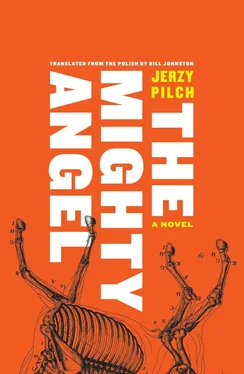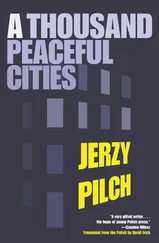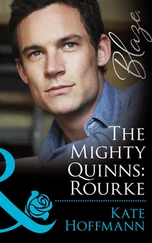Jerzy Pilch
The Mighty Angel
Chapter 1. The Yellow Dress
BEFORE THE MAFIOSI appeared in my apartment in the company of the dark-complexioned poetess Alberta Lulaj, before they wrenched me from my drunken sleep and set about demanding — first with dissembling pleas, then with ruthless threats — that I arrange for Alberta Lulaj’s poetry to be published in the weekly Tygodnik Powszechny , before there began the tempestuous events I wish to recount, there was the eve of those events, there was the morning and the evening of the preceding day, and I, from the morning to the evening of the preceding day, had been drinking peach vodka. Yes indeed, I had been drinking peach vodka, brutishly longing for one last love before death, and immersed up to my ears in a life of dissolution.
Before midday nothing had happened; moderation, even a certain measured asceticism had held sway. Before midday I laid on the couch, read the newspapers, and listened to a record by the Czech tenor saxophonist Feliks Slovák. Yet around midday, of the broad range of melodies performed by Slovák one alone began to penetrate my consciousness; it was a composition by Karel Svoboda entitled “Where’ve you got your nest, little bird?” I listened and wondered to myself how it was in the original Czech: “Kde je tvoje hnízdo, ptáčátko?”, or “Kde je tvoje hnízdo, ptáčku?” I was, however, unable to determine which of the two diminutives— ptáčku , the weaker one, or ptáčátko , the stronger — sounded better and more appropriate, and thus with a feeling of linguistic helplessness (though still enraptured) I rose over and over again from the couch, went up to the record player, and kept playing the piece that had moved me to the core.
It was a beautiful July day; from the twelfth floor I had a clear view of the rim of hills surrounding the city and the level country beyond — the fields, the electricity pylons, the railroad tracks, the bright flowing waters of the river of consolation, the mountains on the horizon, the Vistula like a white pebble at the bottom of a coniferous valley, the Piast Inn and the garden outside that smelled like the first mowing, the swarms of bees and butterflies over mugs of beer. Doctor Swobodziczka’s graying Alsatian laps up its allotted portion from a tin cup; the doctor died a year ago, but the dog, faithful to its addiction, comes to the pub every day, and those who are still alive fill its cup with draft Żywiec poured equitably from a mug.
I saw it all clearly, as if I were there, and here, where I actually was, I saw everything too: the windows in the apartment buildings were open, the occasional car with an old-fashioned streamlined shape moved down some street, and at the ATM stood a woman in a yellow dress with spaghetti straps. From my position high above she seemed wise and beautiful. I suddenly had the certainty that she was the last love of my life. It was an all-embracing certainty; not only the drunken part of me but also the sober part of me, and all the other parts of my soul whose status with regard to intoxication was indeterminate — all seemed to share this conviction. I should immediately have flung on some clothes, splashed myself with cologne, and, without waiting for the elevator, rushed down the stairs and set off on her trail. For a moment I thought entirely seriously about doing just this, but the ATM, the ATM ruled out this love. If I ran down and set off on her trail, I would be acting as I had always acted: I would follow her with the energetic, unswerving step of a serial killer. I would follow her artfully and tenaciously; I would follow her for so long that she would notice me, she would acquire the alarming conviction that someone was inexorably tracking her. Then for a short while longer, already seen and noticed by her, I would continue the chase through the streets with the desperation of an unmasked criminal, until the moment when her unease, her fear, and her curiosity would begin to combine into an explosive substance. . Then — not allowing the explosion to take place — I would quicken my step, draw level with her, give a chivalrous bow and say in the deep voice of a true male:
“I’m terribly sorry, miss, I’m terribly sorry, I’ve been following you” (here my deep male voice would falter, as if from bashfulness), “I’ve been following you for so long that I’ve decided to come clean. .”
At this point she would burst out in rippling laughter, within which female satisfaction would be mingled with relief that the man pursuing her was not some vicious deviant pursuing her to satisfy his lust, but a seasoned connoisseur pursuing her for the sake of beauty.
“Why is it, tell me, why is it you’re chasing after me?” she would ask with an enchanting smile, though her voice would still betray a hint of nervousness.
“Is it really so terribly hard to understand?” I would reply glibly, and I would begin to speak to her with great vigor, and my speech would be like an epic poem of love that overwhelms the listener with the power of its rhythm and its imagery; I would sing for her a song of persuasion and after only a few verses she would be utterly persuaded, willing, compliant, mortally in love, mine already, mine forever, and I would lead her down the bright path of our life together.
But alas I could not do so, I could not apply the classic combination of moves at the appropriate moment. How could I follow on the heels of a woman who has just taken money from an ATM? How could I later explain to the police officer she would summon that my actions were driven not by a thief’s appetite for lucre, but by love at first sight? There was no point in even talking about it, there was no point in even trying; I gave a dismissive wave of the hand, capitulated, and looked lugubriously down from the twelfth floor as the woman who should have become my wife and the mother of my children walked away. With aching heart, I watched the last love of my life move away from the ATM, walk a little further down Jana Pawła, and turn forever, forever into Pańska. Once again in history profound sentiment had lost out to money. I was suddenly consumed with tremendous anger. I was angry at ATMs, which only a few years ago had not even existed. I was overcome by fury; I recalled the fall of the Berlin Wall and I was opposed to the fall of the Berlin Wall, for all those enthusiasts who had demolished the wall with their mason’s hammers had taken the brunette in the yellow dress from me. I was opposed to Solidarity, because Solidarity had taken the brunette in the yellow dress from me; and Lech Wałęsa had taken the brunette in the yellow dress from me, and John Paul II as he cried: “Descend, Holy Spirit,” had taken the brunette in the yellow dress from me, and the Holy Spirit, as it descended and altered the face of the earth, had taken the brunette in the yellow dress from me. My God, O Holy Spirit, I thought, if everything were now as it used to be, if communism hadn’t fallen, if there were no free market economy, if numerous transformations had not taken place in the part of Europe where I was born, there wouldn’t be any ATMs here now, and if there were no ATMs, everything would have worked out perfectly between me and the dark-haired beauty in the yellow dress.
No one, however, not even the Holy Spirit, could turn back the course of history; nothing and no one could turn back the brunette, who in all probability had reached the corner of Pańska and Żelazna. All that was left was suffering, pain, and the bitterness of parting from her dusky flesh enwrapped in the yellow dress. Yet I could not fail to notice that the pain and bitterness of parting intensified the beauty of all that was around me. Feliks Slovák’s tenor sax still sounded piercing and plaintive, perhaps even more piercing and more plaintive than it had before. I raised my eyes. A streetcar was passing through grass so high it could have hidden a horse along with its rider; closer by, in the imposing office buildings that overlooked the ONZ Circle, two uniformed security guards were moving from room to room, switching on the lights, switching them off again, and gazing at me through the Venetian blinds. A white cloud sailed over the rooftops and the antennas; it was a splendid day at the height of summer. It was the kind of day a person waits for all year, or maybe even for years at a stretch, the kind of day on which at any moment a person could give up drinking.
Читать дальше












